

Leaning left or right? This browser plugin looks to bring balance to political news. It’s an election year, which means a lot of mud is being slung in various media outlets.

Oftentimes, it’s hard to find the truth among all of the clutter. But a new online tool could help identify biases in news reporting, pointing consumers of news to other viewpoints, especially when they’ve been fed too many “talking points” from the left or the right. Dubbed Balancer and developed by University of Washington assistant professor Sean Munson, the the free plugin for the Chrome browser watches what news you consume online and then tells you whether your reading history leans right or left.
Pew study: News consumption up via mobile, social media. The Internet is continuing to erode TV, radio, and newspapers as the source of news for Americans.
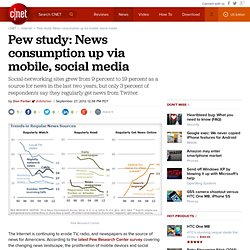
According to the latest Pew Research Center survey covering the changing news landscape, the proliferation of mobile devices and social networks is accelerating the shift to online news consumption. In the survey, 39 percent said that they got their news online, up from 33 percent two years ago. Only TV surpasses online as a news source today. Among 18- to 29-year-olds, one-third watched some TV news, down from 49 percent in 2006. Among those under 30, only 13 percent read a digital or print newspaper, while 33 percent viewed news on a social network and 34 percent saw some news on TV. Newslook iPad app brings order to news video viewing. What is the purpose of a newspaper?
Instagram 'Worth' More Than the NYTimes. This will make you think: at its current, public market valuation, the New York Times company is worth about $50 million less than the $1 billion dollars that Facebook just paid for Instagram. Next Issue Media launches on Android, $15 a month for access to 32 magazines. Less than 10 percent of people rely on Facebook and Twitter for news. Facebook and Twitter might not be as important for news sharing as we once thought — at least for the time being.
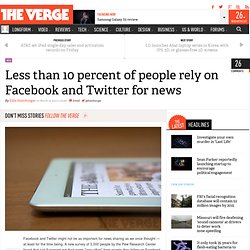
A new survey of 3,000 people by the Pew Research Center found that just 9 percent get their news "very often" from people they follow on Facebook and Twitter. 36 percent of people still get news by going directly to news websites themselves, while 32 percent use search engines to find news and 29 percent use news aggregating websites to hunt down articles to read.
Within Facebook, Pew found that 70 percent of people turn to family and friends for news, while only 36 percent of people on Twitter do so. People on Twitter instead choose to follow more journalists and news publications to get news. Slate Gets Personal With Customized Newsfeed. Online magazine Slate is giving readers more control over the news discovery process with the Monday launch of MySlate, a personalized newsfeed made up of stories from the topics and authors of their choice.
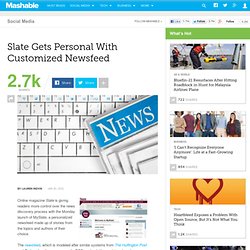
The newsfeed, which is modeled after similar systems from The Huffington Post and Forbes, functions as an on-site RSS reader, letting registered readers subscribe only to the sections, blogs and writers they're interested in. It's both a useful tool and a way for Slate to drive more engagement with its readers, serving them stories they're more likely to click on and alerting them to activity on comments they've left on Slate articles. MySlate is accessible on-site through the top navigation bar on the Slate homepage and via the sharing toolbars on article pages.
Online Publications Need Better Apps. Politico Tapping Into Facebook's Data Gold Mine. Politico, the politics-focused media outlet, is teaming up with Facebook to take a look at Facebook users' opinions of Republican presidential hopefuls.
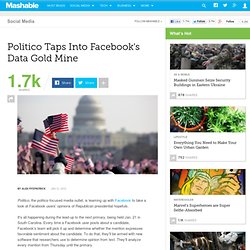
It's all happening during the lead-up to the next primary, being held Jan. 21 in South Carolina. Where Are Our Leaders? Blaming and Dividing. The problem is that journalism’s true. New China blow for Google as Android Marketplace is blocked. Google’s rocky relationship with the Chinese government is under further strain after it emerged that the Android’s app store, Market, is unavailable for many users in China, with others reporting lag and time-out issues accessing the site.
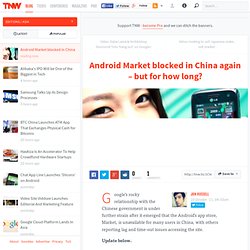
Update below. Blocked In China, a site which tests whether URLs are accessible across five major provinces in the country, confirms a blockage of market.android.com. This isn’t the first time that Android Market has been inaccessible in China, mumours of discontent from disgruntled phone owners unable to access the store can be tracked as far back as 2009. As ever in China, despite the issues there are plenty of alternative options as TechRice outlines. China’s local app stores, which are not blocked, remain the answer for any frustrated Android users, in fact they are the answer for almost ever Android user in China anyway. Has the UN been designed to fail? One of the most astute critics of the United Nations was a man who worked there for years and worshipped its ambitions.

Pew: Tablet owners consume a crazy amount of news but they won’t pay for it. A new Pew Research Center study shows that the behavior of tablet owners is changing significantly when it comes to consuming news, for good and bad.
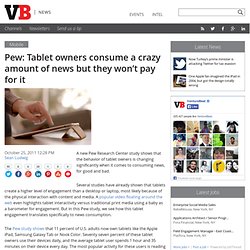
Several studies have already shown that tablets create a higher level of engagement than a desktop or laptop, most likely because of the physical interaction with content and media. A popular video floating around the web even highlights tablet interactivity versus traditional print media using a baby as a barometer for engagement. But in this Pew study, we see how this tablet engagement translates specifically to news consumption. The Pew study shows that 11 percent of U.S. adults now own tablets like the Apple iPad, Samsung Galaxy Tab or Nook Color. Seventy seven percent of these tablet owners use their devices daily, and the average tablet user spends 1 hour and 35 minutes on their device every day. Why won't America embrace the left? - History. Don’t think of it as a newspaper — it’s a data platform. Blottr launches in France, Germany to follow. Blottr is the “people-powered news service” that has thus far allowed UK citizen journalists to capture, collaborate and report on news where they live.
And now, it seems, it’s going international. Blottr was the brainchild of London-based entrepreneur Adam Baker, who funded the initial roll-out back in September 2010.